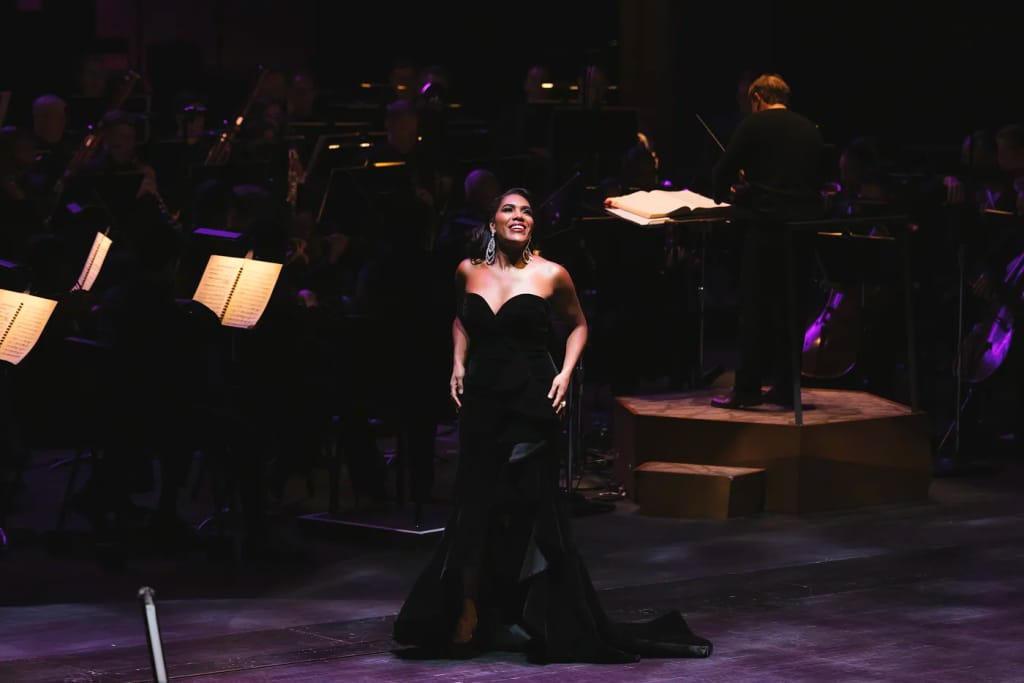- Gathering Note
- Posts
- J’Nai Bridges and Yonghoon Lee lead a thrilling concert performance of Saint-Saëns’ Samson and Delilah at the Seattle Opera
J’Nai Bridges and Yonghoon Lee lead a thrilling concert performance of Saint-Saëns’ Samson and Delilah at the Seattle Opera

J’Nai Bridges sings the role of Delilah with the Seattle Opera. Photo Credit: Sunny Martini
This review was originally published at Seen and Heard International
The last time Camille Saint-Saëns’ opera Samson and Delilah was heard in Seattle in 1965, Lyndon Johnson was in the White House and Seattle was basking in the afterglow of hosting the World’s Fair two years prior, with its new Space Needle adding a distinctive touch to the cityscape. That 1965 run featured a husband-and-wife duo: James McCracken in the role of Samson and Sandra Warfield as the temptress Delilah, whose vindictive quest ultimately devastates Dagon’s temple. Their performance was for more than half a century the Seattle Opera’s sole production of this lurid work — that is until General Director Christina Scheppelmann revived Saint-Saëns’ biblical epic as a concert performance for the 2022–2023 season.
Samson and Delilah has all the trappings of French grand opera: prominent choruses, elaborate ensembles, and even ballets. The work is held back by a few inherent flaws: a lack of theatricality and occasional clumsiness in the narrative and libretto. All things considered, it is no surprise that the Seattle Opera opted for a concert performance instead of putting on a fully staged production.
But without the spectacle of costumes and sets, the burden fell on singers, orchestra, and chorus to bring the opera to life. Leading the performance was a trio of big voices led by mezzo-soprano J’Nai Bridges, a rising star in the opera world, singing the role of Delilah. Bridges was making her Seattle Opera debut, but she was no stranger to the region. She hails from Lakewood, Washington — just south of Tacoma — but traveled far before coming home. Among other accolades, Bridges has recently starred in productions with the Metropolitan Opera and LA Opera of Philip Glass’ minimalist masterpiece Akhnaten.
Bridges’ Delilah was a revelation. Her voice — richly hued — commanded the stage and captivated the audience. Bridges conveyed all of Delilah’s contradictory emotions. At times sensuous, as when she sang Printemps qui commence at the close of Act I, and later treacherous, as she schemes and then seduces to learn the secret of Samson’s strength in Act II. Yet Bridges’ range of expression evidenced a familiarity with the role that her tenor counterpart lacked. Singing Samson for the first time was dramatic tenor Yonghoon Lee. Like Bridges, his career is burgeoning with engagements worldwide. Lee’s Samson was enormous, filling the hall with a bold palette of sound. He was nearly perfect in the role of liberator. But when Samson had to demonstrate more subtly, Lee was less successful. Rounding out the main cast, bass baritone Greer Grimsley, long a favorite to locals as Wotan in the city’s erstwhile Ring Cycles, treated the audience with a return to the Emerald City as the High Priest of Dagon. Grimsley made for an unsettling, menacing religious figure. And audiences can look forward to a return of his booming presence later this year to reprise Wotan in the Seattle Opera’s new production of Das Rheingold — a must-see for any opera fan.
The orchestra, made up largely of Seattle Symphony musicians under the expert direction of their former conductor Ludovic Mortlot, was situated on stage just behind the singers. One of Morlot’s great strengths is his insistence on clarity from the orchestra. He expertly drew out the exoticism of Saint-Saëns, creating a vivid and dynamic soundscape that entranced the audience. The orchestra’s balance was impeccable, allowing the singers to shine without distraction. Even in the final act, when the focus turns to the famous bacchanale, the orchestra whipped up the needed wildness to convey the scene while keeping textures crystal clear. Watching Morlot, it was easy to remember a time when the Seattle Symphony, under the expert guidance of his baton, had forged a distinct and visionary identity.
One final thought on this concert performance of Samson and Delilah. The chorus, singing alternately as crowds of Hebrews and Philistines, is as much a part of the action as Samson, Delilah and the High Priest of Dagon. However, their placement at the back of McCaw Hall’s stage — buried behind the orchestra and soloists — muted their contribution to the performance and left the audience at times straining to hear their parts. When they could be heard, they sounded great: whether as a worn-down yet yearning Hebrew chorus or as vengeful and seemingly victorious Philistines who believe that have finally subdued Samson, their tormentor.
Overall, the Seattle Opera’s concert performance of Saint-Saëns’ Samson and Delilah was a stunning performance that showcased the immense talent of its cast, including J’Nai Bridges’ captivating portrayal of Delilah, Yonghoon Lee’s powerful performance as Samson, and Greer Grimsley’s menacing turn as the High Priest of Dagon. Despite the limitations of the stage, the performances were nothing short of exceptional. It was a memorable night that left the audience eagerly anticipating the next production from the Seattle Opera.